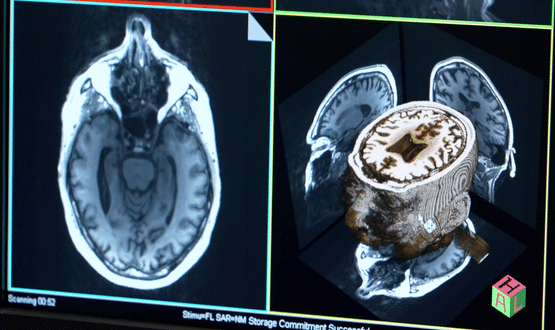Addenbrooke’s Hospital trials AI to help speed up dementia diagnosis
- 27 August 2021

A patient at Addenbrooke’s Hospital in Cambridge has become one of the first people in the country to take part in a new trial using artificial intelligence (AI) to help diagnose and treat Alzheimer’s disease.
Dennis Clark, 75, was referred onto the QMIN-MC trial after his wife Penny noticed he was starting to forget things.
The technology uses a machine learning algorithm developed by Prof Zoe Kourtzi, research lead at the Alan Turing Institute. The algorithm trains itself to diagnose patients by looking at MRI brain scans to identify patterns, it then combines these findings with the results of standard memory tests.
Clark underwent an MRI scan on July 21, 2021 and later that same day he was told his results were consistent with early onset of Alzheimer’s disease and what put on medication to treat the symptoms.
Diagnosing Alzheimer’s disease and dementia can often take many months. It typically requires two or three hospital visits and can involve a range of CT, PET and MRI scans as well as invasive lumber punctures.
Doctors hope the AI solution can be used to provide a one-stop diagnosis, meaning patients can begin treatment to reduce the effects of the disease more quickly and loved ones gain more time to put preparations in place for the longer term.
Addenbrooke’s consultant and clinical lead for the trial Dr Timothy Rittman said: “Traditionally, when we look at patient scans we are looking for patterns to be able to help us exclude things like strokes and brain tumours.
“The computer can do this much more comprehensively than any human, helping to give us not only a more accurate diagnosis, but also a prognosis as well. With a better prognosis we can identify how quickly a patient is moving away from the normal pattern of the disease and amend their treatment and care accordingly.”
To date around 80 patients have taken part in the trial which was run by Cambridge University Hospitals (CUH), Cambridgeshire and Peterborough NHS Foundation Trust and two NHS trusts in Brighton.
The use of AI to help detect dementia is not a novel idea – in November 2019, Cognetivity Neurosciences was awarded a £907,500 grant by Innovate UK to trial its cognitive assessment technology for dementia in clinical settings.
The money went towards a 12-month project to determine whether its machine learning-driven integrated cognitive assessment (ICA) tool can outperform existing techniques in dementia pathways.



